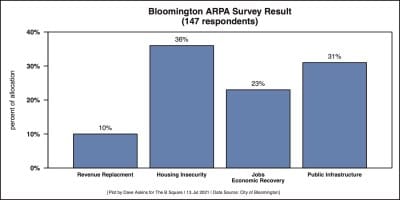Bloomington releases results of American Rescue Plan survey: 147 respondents weigh in on $22.3M

At its July 21 meeting, Bloomington’s city council could be asked by the city’s administration to take a first look at an initial appropriation ordinance for a portion of the $22.3 million that Bloomington has been awarded in American Rescue Plan Act (ARPA) funds.
The ARPA is a $1.9 trillion stimulus bill signed into law by President Joe Biden on March 11, to help counter the effects of the COVID-19 pandemic.
Bloomington’s initial ARPA appropriation ordinance is expected in broad strokes to fall into three kinds of housing supports: response to and prevention of homelessness; affordable housing rental supports; and affordable home ownership support.
That’s based on remarks made by Bloomington mayor John Hamilton at a press conference held in the first part of June.
In the run-up to the July 21 city council meeting, Bloomington mayor John Hamilton’s administration has now released the results of a survey of self-selected respondents promoted on Facebook and Twitter starting on June 18.
A key survey question presupposed that allocation of funds would be made in four general categories: city revenue replacement; housing insecurity; jobs/economic recovery; and public infrastructure.
Based on the scheme used in the survey question, weights between zero and 100 for those four categories were supposed to be assigned to the four categories in a way that totaled 100.
In an email to The B Square, Bloomington’s digital brand manager, Andrew Krebbs, said, “[E]ach person’s total should equal 100, but some respondents didn’t verify their answers totaled 100 so we have a total of 15,034.”
The calculation done by the city on those responses made housing insecurity the top priority among respondents (36 percent), followed by public infrastructure (31 percent), jobs/economic recovery (23 percent), and revenue replacement (10 percent).
The city’s four survey categories are basically those outlined by Hamilton in his presentation to the city council earlier this year.
Three of the city’s four categories overlap with the basic explicit categories of the ARPA—revenue replacement, economic recovery and public infrastructure.
The category added to the mix by the city is the one on housing insecurity, which a memo from the US Treasury indicates is a possible area for expenditure of ARPA funds.
The category not included by the city in its presentations or discussion so far has been the one that would allow a city government to use ARPA funds “to respond to workers performing essential work during the COVID–19 public health emergency by providing premium pay to eligible workers of the metropolitan city…”
The mayor’s office did not respond by the time of publication to a request for comment by The B Square about its omission of potential extra pay for essential workers from its communications about ARPA.
In response to the open-end survey questions, one survey respondent suggested using ARPA money for that purpose: “The City also should use some funds to provide a direct payment to some of our essential workers who worked minimum wage jobs throughout the pandemic.”
The verbatim response continues: “Per the Treasury Department’s guidelines, this would be an appropriate use of the ARPA funds.”
The B Square has parsed the verbatim survey responses into a shared Google Sheet to allow for flagging and sorting.
At a city council work session last Friday, the city’s corporation counsel, Philippa Guthrie gave councilmembers a basic outline of what the administration would be requesting. No dollar figures were attached.
Guthrie described the city’s ARPA plan, which could be amended by the council after it is adopted, as “a work in progress.”
There will be an appropriation ordinance presented in connection with an ARPA “plan.” The ARPA requires that the city council approve a plan in connection with the appropriation.
Among the city council members who attended Friday’s work session, some expressed an interest in voting separately on the APRA plan and any appropriation ordinance.
Councilmember Ron Smith said, ‘I would agree that having separate items to vote on would probably be really good.” He added by way of explanation, “I think it would be clearer for myself, as well as people who might be watching out in the public who are listening.“
That means on July 21, it’s possible an ARPA plan could be presented to the city council, possibly along with a separate first reading of the initial appropriation ordinance. While the initial appropriation ordinance is expected to focus on housing supports, it’s not expected that it would come close to exhausting the city’s ARPA funds
Guthrie said last Friday, “We are just going to be proposing a couple of projects for expenditures in 2021.” She addd that ARPA funds can be spent through the end of 2024.
An ARPA appropriation ordinance, even if given a first reading on July 21, would not normally get a final vote until a subsequent meeting of the city council, probably sometime in August.




Comments ()